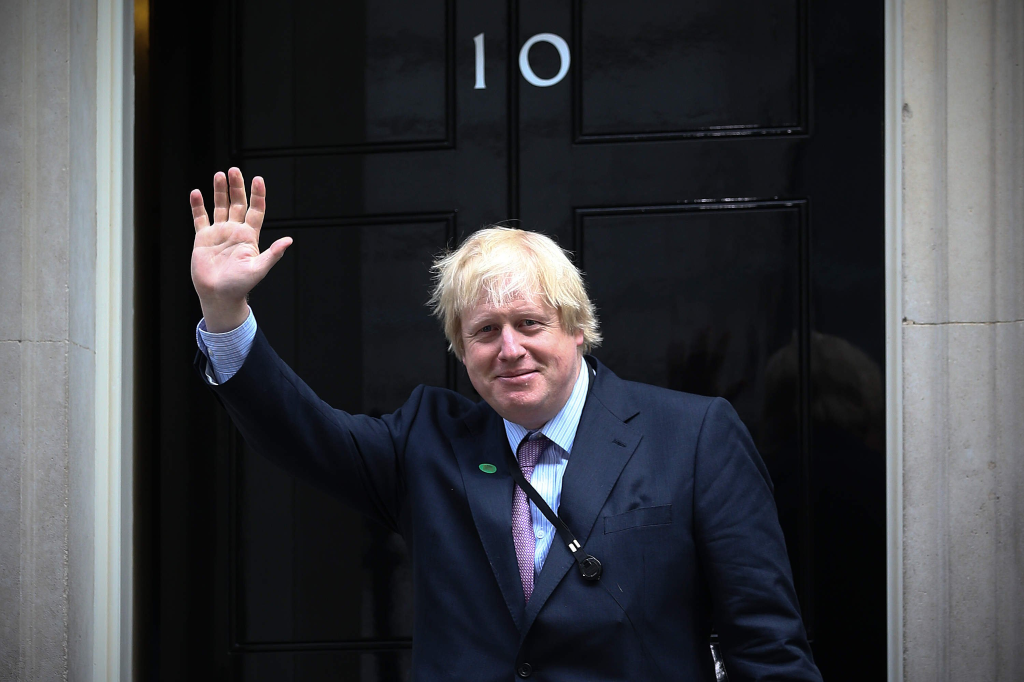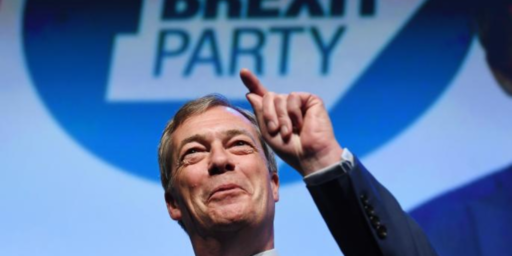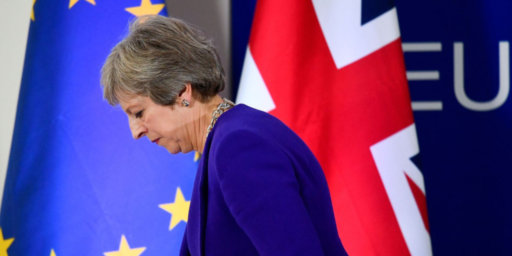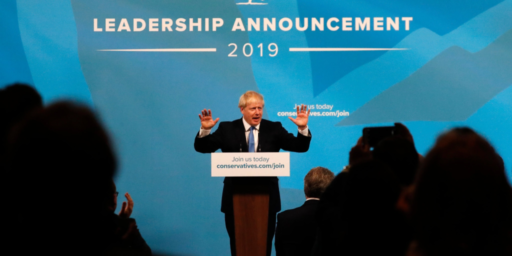Boris Johnson One Step Away From No. 10 Downing Street, Not Everyone Is Happy
As early as Tuesday, Boris Johnson could be confirmed as the winner in the race for Tory leadership. This will make him the next British Prime Minister. Not everyone in the United Kingdom is thrilled about that idea.

If all goes as expected, Boris Johnson is just days away from achieving a goal he’s been focused on for the better part of a decade. As early as Tuesday, the month-long process of choosing a new leader of the Conservative Party, who will, in turn, become the next Prime Minister of the United Kingdom, will be complete. Unless expectations are way off, and they probably aren’t, the winner of the race will be Johnson, and it’s not likely to even have been close. That doesn’t mean everyone in the United Kingdom is thrilled about the idea that their new head of government will be someone with the baggage that Johnson will be dragging along with him into No. 10 Downing Street:
LONDON — In the 2016 Brexit referendum and the 2017 general election, Henry Pritchard was not eligible to vote. He was too young.
Now, having surpassed the legal voting age, 18, and eager for the government to change its course on leaving the European Union, he is desperate for an opportunity to have his say.
With Prime Minister Theresa May departing and the Oct. 31 Brexit deadline looming, choosing the country’s next leader is one of the most important decisions in a generation or more to confront Britons. But in the coming week’s election, Mr. Pritchard once again finds himself excluded.
“This is my future, Brexit is my future, but I am not allowed to participate in the process of deciding what that future might look like,” the 19-year-old gap-year student said in a phone interview.
Only 160,000 members of the Conservative Party will vote for Britain’s next leader because under the parliamentary system, the prime minister is elected directly by the governing party. And that is not going down well among the 99 percent of the population who feel shut out of the process. The reality that less than 1 percent of registered voters will make the consequential decision at such a critical time has left many questioning the very foundation of their democracy.
The future of our country is going to be decided by a handful of out-of-touch toffs,” said Chris Richardson, 21, a civil engineering student.
“The Tories have made a complete mess of Brexit over three years and have ultimately failed,” he added. “It’s not too late to avert the crisis, and the public is desperate to have its say, but instead we are being shut out further and are forced to watch this slow-motion car crash. It’s brutal.”
Until Brexit, few Britons voiced dissatisfaction with their country’s political system. Even when the leader steps down, as Mrs. May announced she would in May after failing to get her Brexit deal through Parliament, there is no requirement for holding a general election. Both John Major and Gordon Brown took office as prime minister without a general election.Most galling for many is that the decision lies with the Tories, whose party members are determined to have Brexit delivered by Oct. 31 at any cost. That view has been rejected by the majority of the population but trumpeted by Boris Johnson, the front-runner in the prime minister’s race with a 48-point lead, according to a recent YouGov poll.
(…)
“Members of Parliament electing a prime minister is a central part of parliamentary democracy, so even if the system could be changed it would fundamentally undermine the principle of parliamentary confidence,” said Owen Winter, the director of Make Votes Matter, a political group that campaigns for proportional representation.
The current leadership contest, however, has resulted in greater awareness of how unrepresentative the House of Commons is. The share of seats each party gets does not match the share of votes it receives, which has resulted in more people — including Conservative Party members — calling for an overhaul of the “first past the post” voting system. Critics say it favors larger political parties, which have a larger geographical base.
The Conservative Party lost its parliamentary majority in the 2017 general election, but struck a deal with Northern Ireland’s Democratic Unionist Party to support Mrs. May on certain issues in exchange for financial support.
“The new prime minister will have a majority in the House of Commons despite the Conservatives and D.U.P. winning only 43 percent of the vote in 2017,” Mr. Winter said. “If Parliament genuinely represented how people voted, the issue of an internal leadership election would be far less problematic, because the new leader would still have to win the support of M.P.s from multiple parties, representing a majority of voters.”
Having overwhelmingly voted to remain in the European Union, young Britons feel increasingly alienated and ignored by politicians during the Brexit process and the selection of the next prime minister.
“Most politicians don’t campaign directly towards young people simply because of low youth voter turnout, making it not worth their effort, which results in young people’s concerns not being listened to,” said Oscar Redgrave, 17, who started a pro-European Union campaign group for youths in Shropshire, in midwest England.
“It’s really important that young people are listened to,” he added, “because we will have to live with certain policy and other decisions like Brexit for the longest.”
Even pro-Brexit youths are feeling left out.
“Not all Brexit voters believe in leaving no matter what the circumstances,” said Ashley Turner, 24, who works on her father’s farm and supports Mr. Johnson’s rival for prime minister, Jeremy Hunt, who has not committed unequivocally to leaving by Oct. 31. While Ms. Turner favors leaving, she worries that a no-deal Brexit would be a disaster for British agriculture and possibly ruin her family’s business.
“The politicians have a responsibility to avert an economic calamity, and I think Jeremy Hunt is capable of leaving with a good deal,” Ms. Turner said in a phone interview. “But what does our opinion matter when we don’t even get a vote? It’s a weird kind of democracy we live in.”
The internal Conservative Party vote takes on added significance due to the fact that, as mentioned, there is currently a deadline of October 31st for the United Kingdom to submit a plan to Parliament to approve for what would amount to a “soft Brexit” that would seek to limit the immediate pain of breakng away from the European Union.
As things stand, the European Union has given the United Kingdom until October 31st to come up with a Brexit deal acceptable to both parties. Originally, of course, the deadline was supposed to be on March 29th, but when it became clear as that date approached that there would be no deal approved by Parliament, the E.U. negotiators acceded to requests from May to extend the deadline. At first, the deadline was extended to mid-April but that was quickly extended another six months when it was clear that there was no way that soon to be former Prime Minister Theresa May would be able to come close to a deal that would clear Parliament in time. This extension came after the E.U. leadership had initially balked at the idea of extending the deadline, but the domestic political situation in the United Kingdom made it clear that a mid-April deadline was impractical.
While there is at least a possibility that this deadline could be extended if negotiators for the European Union and the British government agree to it, Johnson has taken a hardline stance that the United Kingdom would be out of the E.U. regardless of whether or not there is a deal or not. This second option is called a “hard Brexit” and would likely be far more disruptive to the British economy in the near term, and perhaps longer down the line.
In any case, in his campaign for Tory leadership, Johnson has said he’d be willing to accept a hard Brexit and has said in the past and recently that he would be willing to take the extraordinary step of suspending Parliament to get a hard Brexit accomplished. Opposition politicians are already threatening lawsuits if Johnson takes this step, and it is one that is likely to prove to be unpopular with a public that has grown ambivalent about Brexit itself, but the process could be stopped altogether due to the fact that Johnson would need royal assent to suspend Parliament and there is at least some possibility that Queen Elizabeth II would decline Johnson’s request, something that would apparently be within her discretion.
It also seems clear that suspending Parliament to get Brexit through could be a move that puts Johnson’s hold on power on the line just as the nation needs stable leadership. As noted above, and as I’ve noted before, public opinion about Brexit has become far more unsure than it was three years ago when the ‘Leave’ forces won the referendum by an exceedingly narrow margin. Taking the extraordinary step of suspending Parliament to get Brexit through, rather than seeking an extension and trying to work out a deal acceptable to all sides, seems likely to prove to be highly politically unpopular. In that case, the fact that Johnson will be entering office with a “mandate” given by what amounts to far less than 1% of the British population could mean that his tenure in office will be much shorter than he probably hopes.





Well, my unthrilledness is considerable, as if that mattered one bit.
Bloody Stupid Johnson as Prime Minister.
Marx on farce doesn’t begin to capture the ignominy of it.
Oh, and Iran has seized a British flagged tanker in the Gulf.
Ooops.
You could power the national grid from the spin of every dead PM since Lord North.
What’s the likelihood that the DUP refuses to form a government with Johnson as PM? I haven’t seen that addressed. If that were to happen, there would be a national election, right?
The DUP will ask for, and get, bribes on a scale to shame the Byzantines.
Plus they are very worried about a Corbynite Labour government.
(Though in fact the list of mainland politicians aching for payback time re. the DUP is a lot wider than Labour and growing steadily).
They will, IMHO, for that and for the indulgence of their half-witted concepts of the constitutional status of Northern Ireland, agree a renewed confidence and supply arrangement with the Tories.
In return, Johnson will betray them the instant he thinks it is in his interest and he can get away with it.
Fintan O’Toole on Johnson is a good analysis IMHO.
How awful is Corbyn that Johnson is almost preferable as an alternative (and both are polling behind “other”)?
@JohnSF: Ah, good. I was looking for that to post again. (My Google-fu isn’t as good as yours.)
@Hal_10000: Corbyn is one of those idealists who a) wants to cut loose from the EU so he can create his socialist utopia and b) is so convinced that he is Right he’s totally ignoring that Labour is fraying into bits due to internal dogfighting. I think his idea about Brexit has been to sit on the fence as long as possible, wait until the Tories take the UK out of the EU with their own Brexit, and then swoop into power when the whole thing turns turtle. So he’ll be in power, the UK will be on its own, and he will have been able to palm off all the blame on the Tories.
Another analysis of Boris Johnson.